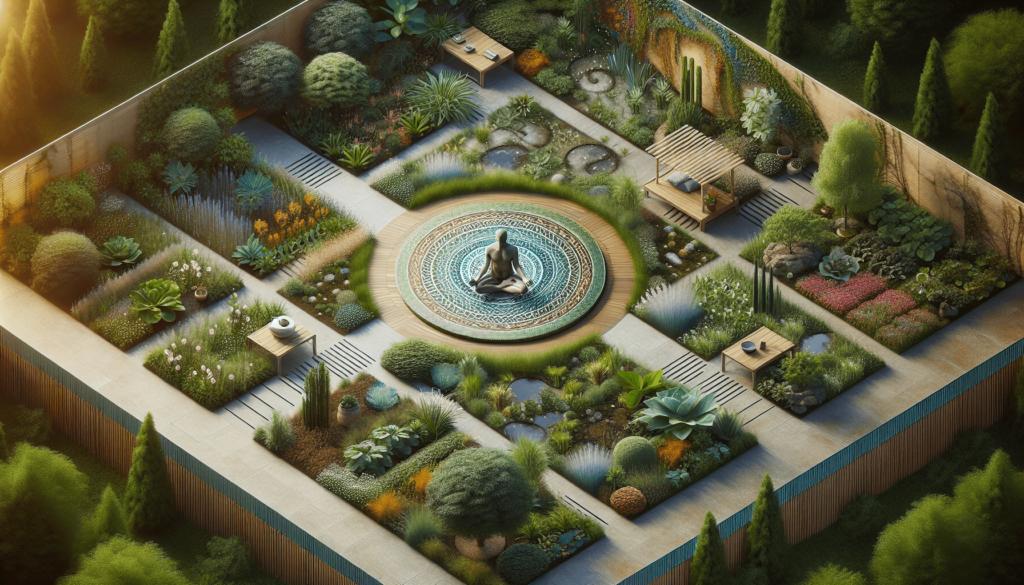Have you ever considered the impact that gardening can have on your overall well-being? Whether you’re a seasoned gardener or just starting out, creating a holistic garden can benefit both your mind and body in more ways than you might realize. Let’s explore how you can cultivate a garden that nurtures not only your plants but also your own well-being.
Understanding the Concept of Holistic Gardening
Holistic gardening is more than just tending to plants; it involves looking at the garden as a whole system. When you approach gardening holistically, you consider the interconnectedness between plants, insects, soil, water, and even your own energy. By taking a holistic approach, you can create a harmonious environment that promotes balance and well-being.
Consider the Interconnectedness of Your Garden
When you view your garden as a living ecosystem, you start to see how everything is connected. For example, the health of your soil directly impacts the health of your plants. By nourishing the soil with compost and organic matter, you provide essential nutrients for your plants to thrive. Remember, a holistic garden is like a puzzle where every piece plays a crucial role in the overall picture.
Benefits of Cultivating a Holistic Garden
The benefits of holistic gardening extend beyond just having a beautiful and productive garden. Here are some ways in which cultivating a holistic garden can positively impact your mind and body:
Stress Relief and Mental Well-being
Gardening has been proven to reduce stress and anxiety levels. Spending time in nature, tending to plants, and getting your hands dirty can have a calming effect on your mind. The physical activity involved in gardening also releases endorphins, which are known as “feel-good” hormones that can boost your mood and overall mental well-being.
Physical Exercise and Health
Gardening is a great way to get some physical exercise without the need for a gym membership. Digging, planting, weeding, and watering your garden can be a good workout for your body. The repetitive motions involved in gardening can also improve your flexibility, strength, and coordination. Plus, the vitamin D from the sun can help boost your immune system and bone health.
Connection with Nature
In today’s fast-paced world, it’s easy to feel disconnected from nature. Cultivating a garden allows you to reconnect with the natural world and appreciate the beauty and rhythms of the earth. Spending time outdoors, observing the growth of plants, and witnessing the changing seasons can help you feel more grounded and connected to the world around you.
Healthy Eating and Nutrition
Growing your own fruits, vegetables, and herbs in a holistic garden can encourage you to eat more fresh, organic produce. Knowing exactly where your food comes from and how it’s grown can give you peace of mind and promote a healthier diet. Eating homegrown produce also means you’re consuming food that is free from harmful chemicals and pesticides.

Creating a Holistic Garden Space
Now that you understand the benefits of holistic gardening, let’s explore how you can create a garden space that nourishes both your mind and body. Here are some tips to help you cultivate a holistic garden:
Design a Functional Layout
Start by designing a garden layout that is functional and suits your needs. Consider factors like sunlight exposure, water drainage, and accessibility when planning your garden space. Create designated areas for different purposes, such as growing vegetables, herbs, flowers, or creating a meditation space.
Choose Native Plants and Companions
Selecting native plants that are well-suited to your climate and soil can help create a more resilient and sustainable garden. Native plants are adapted to local conditions and require less maintenance, water, and fertilizer. You can also plant companion plants that attract beneficial insects, repel pests, or provide nutrients to other plants.
Practice Organic Gardening Methods
Avoid using synthetic chemicals, pesticides, and fertilizers in your garden, as these can harm the environment and disrupt the natural balance of your garden. Instead, opt for organic gardening methods such as composting, mulching, crop rotation, and companion planting. These practices can help improve soil health, reduce pests, and promote biodiversity.
Create a Relaxation Zone
Incorporate elements that enhance the restorative power of your garden, such as a seating area, water feature, or meditation space. Create a peaceful environment where you can relax, unwind, and connect with nature. Adding fragrant flowers, herbs, or essential oils can also stimulate your senses and promote relaxation.
Implementing Mindful Gardening Practices
In addition to creating a holistic garden space, practicing mindful gardening techniques can further enhance your experience and well-being. Here are some mindful gardening practices to incorporate into your routine:
Connect with Your Garden
Take time to observe, listen, and connect with your garden on a deeper level. Notice the colors, textures, scents, and sounds of your garden as you tend to your plants. Engage all your senses and be present in the moment as you interact with nature.
Practice Patience and Acceptance
Gardening teaches you the value of patience and acceptance. Understand that not everything will go according to plan, and that’s okay. Embrace the process of growth, change, and resilience that comes with gardening. Learn to adapt to challenges and setbacks, and see them as opportunities for growth.
Practice Gratitude and Mindfulness
Express gratitude for the abundance of nature’s gifts and the opportunity to cultivate your garden. Practice mindfulness by focusing on the task at hand and being fully present in the moment. Allow yourself to experience a sense of peace, joy, and contentment as you nurture your garden.
Engage in Reflection and Journaling
Take time to reflect on your gardening experiences and journal about your observations, thoughts, and feelings. Use a garden journal to document your progress, successes, failures, and lessons learned. Reflecting on your gardening journey can help you gain insights, stay motivated, and track your growth over time.

Conclusion
Cultivating a holistic garden for mind and body is a rewarding and fulfilling experience that offers a plethora of benefits for your overall well-being. By understanding the interconnectedness of your garden, embracing mindful gardening practices, and creating a harmonious garden space, you can nurture not only your plants but also your own mind, body, and soul. Remember, gardening is not just a hobby; it’s a therapeutic and transformative journey that can enrich your life in more ways than you can imagine. So, get out there, dig in the dirt, and let nature work its magic on you. Happy gardening!

